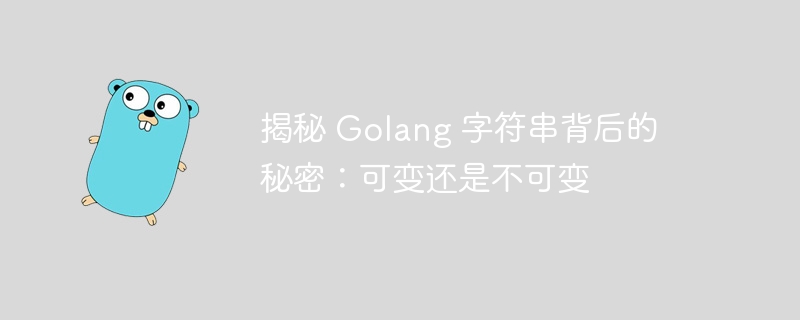Home >Backend Development >Golang >Uncovering the secrets behind Golang strings: mutable or immutable
Uncovering the secrets behind Golang strings: mutable or immutable
- WBOYWBOYWBOYWBOYWBOYWBOYWBOYWBOYWBOYWBOYWBOYWBOYWBOriginal
- 2024-04-08 11:27:02796browse
Go strings are immutable, but can be modified through pointers. 1. String is a value type and a new value is created when a new variable is assigned. 2. Pointers can point to strings and modify their contents. 3. String concatenation creates a new copy without affecting the original string.

In-depth explanation: Uncovering the mystery of the variability and immutability of Go strings
In the Go language, strings are a very important data type , used to store text data. However, whether strings are mutable has always been a topic of debate among developers. This article will deeply analyze the mutability of strings in Go and illustrate its essence through practical cases.
String type: value type
In Go, strings are value types, which means that when we assign a new variable, a new value is created. For example:
name := "John" anotherName := name
At this time, anotherName and name are copies pointing to different memory units. Any changes made to anotherName will not affect the value of name.
String modification: through pointers
Although the string itself is immutable, we can still modify the content of the string through pointers. A pointer is a data type that refers to the memory address of a variable. For example:
package main
import "fmt"
func main() {
name := "John"
ptr := &name
// 通过指针修改字符串
*ptr = "Jane"
// 打印修改后的字符串
fmt.Println(name) // 输出:Jane
}In the above code, ptr points to the memory address of the name variable. By dereferencing the pointer (using *), we can obtain the variable pointed to and modify its contents.
Practical case: splicing strings
String splicing is a common operation to modify strings. In Go, we can use the operator to concatenate two strings. For example:
name := "John" lastName := "Smith" fullName := name + " " + lastName // 输出:John Smith fmt.Println(fullName)
Note that the operator creates a new copy of the string, which means that the values of name and lastName are not will be modified.
Conclusion
In summary, in Go, string is an immutable value type, but its content can be modified through pointers. When modifying strings, consider using pointers to avoid creating unnecessary copies and improve performance.
The above is the detailed content of Uncovering the secrets behind Golang strings: mutable or immutable. For more information, please follow other related articles on the PHP Chinese website!

